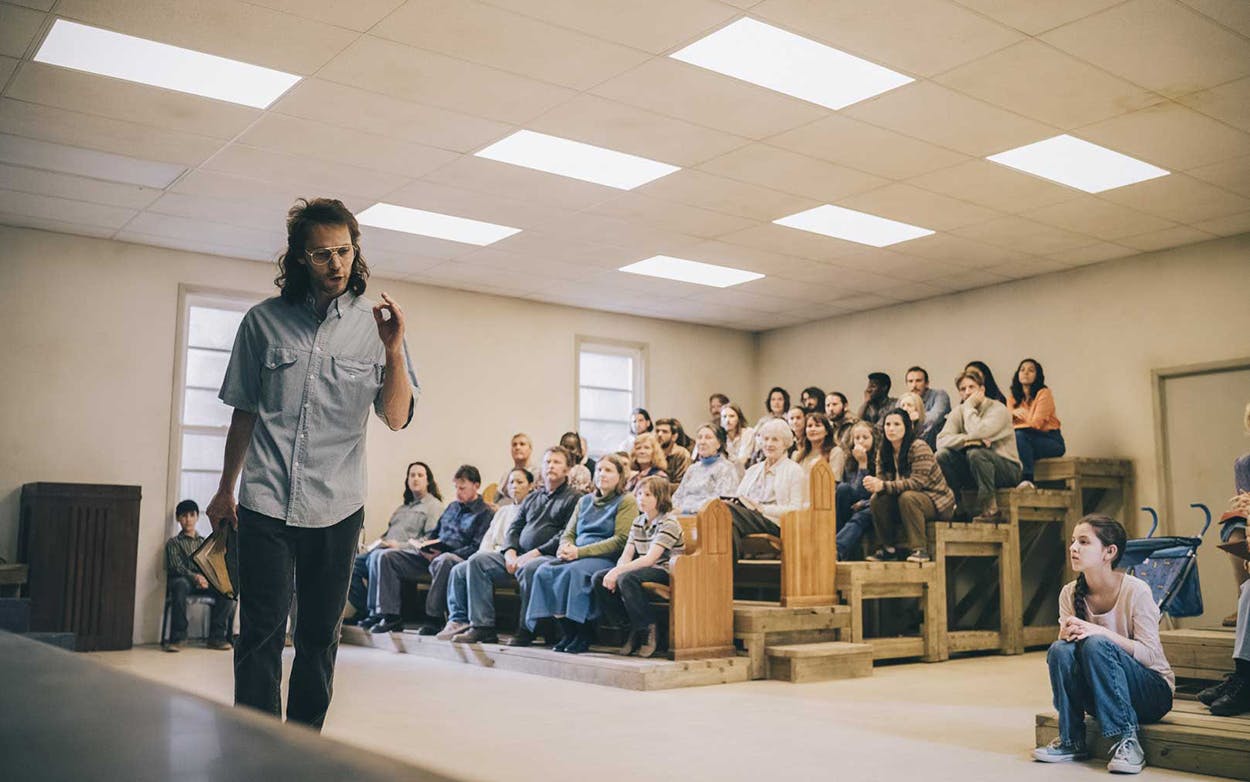Wednesday’s second Waco installment ends with what is generally thought to be the beginning of the Branch Davidian disaster: the Bureau of Alcohol, Tobacco, Firearms, and Explosives (ATF) barreling down a dirt road toward Mount Carmel with an army of agents and a fleet of guns.
But the tragedy that happened just outside of Waco, of course, didn’t begin when the ATF showed up at the Branch Davidian’s doorstep. Waco, then, rightfully spends two of its six episodes detailing the missteps that led to the death of four ATF agents and 82 Branch Davidians. The layers of the story—the ATF trying to prove its worth to Congress, the FBI’s militarization against citizens, David Koresh’s effective rule over the Branch Davidians—are just as essential as the dramatic outcome.
The premiere introduced us to the Branch Davidians under Koresh’s leadership as an isolated sect of people who lived quietly and studied their doctrine constantly. To be devoutly religious is not a crime—certainly not in Waco, where there are over 300 active churches. But the second installment of Waco seems to ask if the Branch Davidians’ devotion was ultimately dangerous. Although the series works to make us believe this is a complicated question, a handful of scenes involving Rachel Koresh, David’s wife, make the answer quite simple: the Branch Davidians at Mount Carmel were, indeed, dangerous. But if the ATF could have seen Mount Carmel as anything more than a professional conquest, they might have realized that under David Koresh’s teachings, the Branch Davidians were also endangered.
In the episode’s most heart-wrenching scene, Michelle Jones (Julia Garner) confronts her older sister Rachel Koresh (Melissa Benoist) about her role in allowing Michelle to be married off to David—her sister’s husband—as a pre-teen. “I was twelve when David had his vision that he should take me as his second wife,” Michelle cries while a storm brews just beyond the clotheslines. “And no one knew what to do about it—until you had your dream that God demanded it!” Rachel, asking if Michelle believed she would have wanted her to share her own husband, replies: “We follow God’s lead regardless of what we might want.”
And now, Michelle laments, the children she conceived as a child herself are about to be taken away. By this time, the Branch Davidian leaders know that the men staying next door aren’t ranchers, but some form of law enforcement. The sect had to prepare for discovery, and in order to tie up any legal loose ends, David and Rachel convince recent convert David Thibodeau to marry Michelle. Most importantly, Thibodeau needs to claim Michelle’s children, since David’s marriage to her would be polygamy if they claimed it was legal-with-parental-consent, and statutory rape if they said they weren’t married. And just like that, Michelle finds herself in another union to another man she didn’t choose.
Yes, the guns stockpiled in the Branch Davidian’s walk-in pantry are dangerous. But the true risk that the Branch Davidians present, as this episode shows, is their unwavering belief in David. If their faith is strong enough for a woman to sacrifice her twelve-year-old sister to her own husband, then what might they do with the prophecy that we hear him profess in this episode? David claims that he’s the Lamb of God, sent to open the seven seals of Revelation, and that the Branch Davidians have been sent to Mount Carmel to open the fifth of those seven seals. “Opening the fifth seal, as I’ve been telling you for years,” preaches Koresh, “will begin when the armies of Babylon come to our door to spill our blood. We will then be tested—mind, body, and spirit.”
In the episode, undercover ATF agent Robert Rodriguez (John Leguizamo) just misses the details of that armies-of-Babylon prophecy as he enters the Branch Davidian’s chapel. But he didn’t need to hear the foreboding message to know that the ATF’s plan to serve David a search warrant by force was doomed to fail. Because in his limited time spent on the Mount Carmel compound, Rodriguez began to understand David and his leadership.
David Koresh had conviction. His followers believed his prophecies because he believed he did, and the series would have us believe that of his hundred some odd followers, David followed his own message most devoutly. The Branch Davidians had reason to believe that Rodriguez was an undercover agent of some kind, and that they let him inside Mount Carmel anyway. Because, as David tells his senior congregants in Wednesday’s episode, he believes that he can “turn him.” After all, many of his congregants came to him as doubters. “There are people in this world who can hear the truth,” David tells them. “God sent him to me. Who am I to turn him away?”
Much of the series’ account of Rodriguez’s breach of the Mount Carmel compound is fictional, but the end result is not: in learning directly from David that the surprise element of the ATF’s upcoming raid had been compromised, Rodriguez reports back to his superiors that they have to call off the forceful raid they’ve planned. Because Rodriguez knew David; he knew his convictions and his prophecies, and how a militarized federal raid of his home would play into those prophecies.
Meanwhile, fighting his own internal battles at the FBI, we see Gary Noesner tell the few who will listen that more money for the armed Hostage Rescue Team is the wrong direction for the Bureau to be headed. “There’s a paradox to power,” he tells his superior. “The more force you bring to a situation, the more likely you are to meet resistance.”
It’s the FBI’s belief, however, that “show of force” is what will brings people to the negotiating table in the first place. But not if those people have nothing to negotiate—not if those people feel they’re fulfilling a righteous prophecy. Next week, on Waco: the armies of Babylon arrive.






